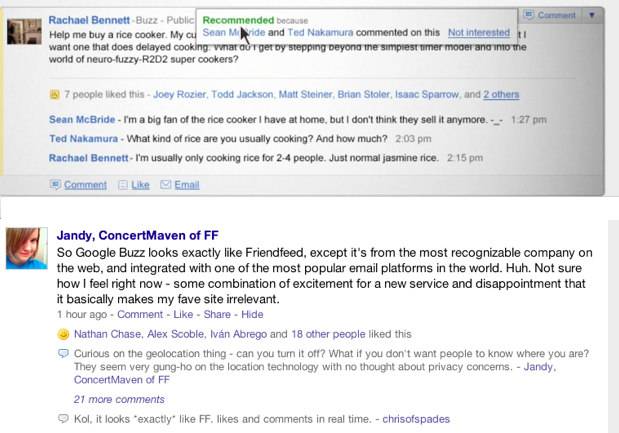Google just launched Google Buzz, the company’s new social networking service which will be tightly integrated with Gmail. There can be little doubt that Google Buzz looks a lot like FriendFeed, the social aggregation service that was acquired by Facebook in August 2009. Today, FriendFeed’s developers are Facebook employees and aren’t likely to continue to improve the service in any meaningful way, while the active user community on FriendFeed continues to shrink rapidly. Given the similarities between the two services, we can’t help but wonder if Google Buzz will be able to succeed where FriendFeed couldn’t.

ReadWriteWeb’s full coverage and analysis of Google Buzz:
As Louis Gray points out, Google Buzz validates FriendFeed’s ideas, but it also marginalizes the service even more. While some will look at Buzz as a Facebook/Twitter competitor, it also represents the final nail in FriendFeed’s coffin. We will surely see a lot of FriendFeed’s features appear on Facebook in the future, but FriendFeed as a stand-alone service has now lost its relevancy before it ever got a chance to go mainstream.
The real question, though, is whether Google Buzz will be able to succeed where FriendFeed couldn’t. FriendFeed never made it out of the early-adopter phase and slowly became a self-referential community that was never quite accessible enough for a larger audience.
Looks Familiar?
If you are not familiar with FriendFeed, just have a look at these two screenshots:

Google’s Advantage: Lifting FriendFeed’s Best Ideas and a Huge Built-In User Base
Google Buzz has a number of advantages over FriendFeed. While FriendFeed tried to attract early adopters and mostly catered to their tastes, Buzz has a built-in audience already. While FriendFeed had to work hard on building a thriving community and never managed to attract a large mainstream audience, Gmail is one of the world’s most popular email services and thanks to this, Buzz has millions of potential users from day one.
Also, while FriendFeed tried to allow users to connect to as many social services as possible, Google Buzz is just starting out with a few core Google and third-party services for now (Flickr, Picasa, Google Reader and Twitter). This will make it far more accessible than FriendFeed ever was.
Google is also putting a lot of emphasis on location-based and mobile services here, which is something FriendFeed never did. FriendFeed, for example, never offered a mobile app, while mobile apps and sites are one of the areas where Google is focusing on with Buzz.
The Buzz team has also been able to lift some of the best ideas from FriendFeed. You can “like” items, comment on them, you can see who liked a post (which looks identical to FriendFeed’s implementation of this feature) and Buzz will recommend items that it thinks will be interesting to you because your friends also liked them or commented on them.
What do you Think?
Do you think Buzz’s built-in mainstream user base help it to succeed where FriendFeed failed?





















